
Related
Guests
- Bill McKibbenco-founder of 350.org. His latest book is titled Falter: Has the Human Game Begun to Play Itself Out?
The Trump administration notified the United Nations Monday that it would withdraw the U.S. from the historic Paris climate agreement, starting a year-long process to leave the international pact to fight the climate crisis. The United States — the world’s largest historic greenhouse gas emitter — will become the only country outside the accord. Trump’s announcement of the withdrawal came on the first day possible under the agreement’s rules. From Middlebury, Vermont, we speak with Bill McKibben, co-founder of 350.org. “The decision of the United States to be the only country on Earth … unwilling to take part in a global attempt at a solution to the greatest crisis we’ve ever faced — there’s a lot to be ashamed of in the Trump years and a lot of terrible things that have happened — it’s pretty hard to top that,” says McKibben.
Transcript
JUAN GONZÁLEZ: The Trump administration has formally notified the United Nations that it will withdraw the U.S. from the historic Paris climate agreement, starting a year-long process to leave the international pact to fight the climate crisis. The U.S., the world’s largest historic greenhouse gas emitter, will become the only country outside of the agreement. The 2015 agreement aims to limit global temperature rise to less than 1.5 degrees Celsius, a target that would prevent the worst effects of catastrophic climate change. Secretary of State Mike Pompeo announced the news Monday, tweeting, quote, “Today we begin the formal process of withdrawing from the Paris Agreement. The U.S. is proud of our record as a world leader in reducing all emissions, fostering resilience, growing our economy, and ensuring energy for our citizens. Ours is a realistic and pragmatic model.”
The announcement comes as the effects of the climate crisis are already being felt around the world, from the wildfires raging in California to extreme drought in parts of Central America to a worsening monsoon season in South Asia. Last week, a new study published in Nature Communications warned that 300 million people are at risk of being displaced due to rising sea levels by 2050. According to the report, global sea levels are expected to rise between two to seven feet, and possibly more, wiping some coastal cities off the map.
AMY GOODMAN: The U.S. withdrawal from the climate accord was declared on the first day possible under the accord’s rules and will take a year to take effect, meaning the process will conclude the day after the 2020 presidential election.
In a piece for The Guardian headlined “A climate denier-in-chief sits in the White House today. But not for long,” 2020 presidential candidate Elizabeth Warren wrote, quote, “The next president must rejoin the Paris Agreement, but that alone is not enough. Instead, she must show the world that the United States is ready to once again lead on the international stage. The first step is to submit a new US commitment under Paris raising our previous target to achieve rapid emission reductions. … In November 2020, it won’t just be Donald Trump on the ballot but also the chance to renew America’s climate leadership for a safer, cleaner, more secure and more prosperous future,” she said.
Well, for more, we’re joined via Democracy Now! video stream by Bill McKibben, co-founder of 350.org. His latest book, Falter: Has the Human Game Begun to Play Itself Out? He’s joining us from Middlebury, Vermont, where he lives.
Bill, welcome back to Democracy Now! Can you talk about the significance of the formal pulling out of the U.S. climate agreement, Pompeo and Trump announcing?
BILL McKIBBEN: Well, look, this has been coming for a year since Trump announced his initial decision. In some sense, it’s no surprise. Mike Pompeo is the congressman who took more money from the Koch brothers than any other member of Congress, which is not an easy sweepstakes to win. I mean, this is, in one sense, what was expected. In another sense, it’s deeply historic. When people look back, if they’re able to, and write the story of this time, the decision of the United States to be the only country on Earth — let’s be clear, the only country on Earth — unwilling to take part in a global attempt at a solution to the greatest crisis we’ve ever faced — there’s a lot to be ashamed of in the Trump years and a lot of terrible things that have happened — it’s pretty hard to top that.
JUAN GONZÁLEZ: And, Bill, you’ve said that the decision to withdraw is the greatest success of the, quote, “denial machine” that the fossil fuel industry launched 30 years ago. Could you elaborate on that?
BILL McKIBBEN: Sure, sure. We now know, from great investigative reporting, that the fossil fuel industry knew everything there was to know about climate change in the 1980s. Exxon was the biggest company on Earth. They had great scientists. Their product was carbon. Of course they were going to study it. And their scientists told them, with uncanny accuracy, what the temperature and the CO2 concentration would be in 2019. Understanding that this was a threat to the world, but also a threat to their business, they took the second more seriously than the first and began this decade-long process of climate — decades-long of climate denial and delay and obfuscation, setting in motion all these kind of fake think tanks and so on and so forth.
That’s what came to a head with this withdrawal from Paris. It was the ultimate conclusion of all that work at disinformation. From one point of view, it was extremely successful: The fossil fuel industry had its most profitable years in the last three decades. On the other hand, we’re now missing half the sea ice in the summer Arctic. The Great Barrier Reef is half-dead. You know, the oceans are 30% more acidic. California is on fire more weeks than not. We’re in deep, deep trouble. And the idea that we’re just going to put our hands over our eyes, over our ears or over our mouth at this point is about as depressing as it’s possible to get.
JUAN GONZÁLEZ: And, Bill, I wanted to ask you, in terms of the direct effects that people are feeling here of climate refugees, about — I wanted to ask you about the situation in Central America. The immigration battle has not paid much — few few people have paid attention to the ongoing crisis in Central America, the drought that has now been really affecting that region since about 2014, and it’s continued to get worse, to the point that the World Food — the U.N.'s World Food Program recently said that levels of food insecurity that have not been previously seen in the region exist there. You could argue that many of the people coming from Honduras, from Guatemala and from El Salvador, where the dry corridor of that region is, are, in effect, the first real climate refugees that we're seeing coming into the United States.
BILL McKIBBEN: Juan, I’m so glad you brought that up. I mean, I got arrested at an immigration protest in August, just because I wanted to draw attention precisely to the link that you’re describing. If you go look at a map, Central America is one of the few places on the planet where there are big oceans on both sides of a narrow strip of land. The oceans are warming much faster than the land surface. That’s where most of the heat is going. And that means that those who are close bordered to them, especially on both sides, are dealing with some very powerful and freakish effects. The droughts are extraordinarily deep in the highlands of Honduras, Guatemala, and that’s one of the things that’s driving people north to the border, just as the huge drought in Syria a decade ago helped set the stage for the trauma, turmoil and refugees we’ve seen there.
Here’s how to put this in perspective. The U.N. estimates that we could see a billion climate refugees in the course of this century. And that’s a number that may have gone up in the last week or so. This very scary new study on sea level rise is one that everyone should be paying attention to. It’s not about, in this case, an increase in the rate at which the sea level is rising. It’s about a recalibration of how high most of the world’s coastal cities are. It turns out that the radar was — satellite data was misleading people, and many of these cities and regions are much lower to the ocean than people had thought. And when you look at the maps of where we’re going to be by 2050, they show things like almost all of the Mekong Delta in Vietnam underwater. That’s one of the most important rice-growing regions on the planet, if not the most — well, one of them, anyway. This is truly terrifying to look at those pictures and to realize just how fast this is coming now.
AMY GOODMAN: And then you have, with the mass protests against inequality in Chile, the Chilean president announcing he’s canceling COP, and Madrid now taking up the responsibility of the December U.N. climate summit. The significance of this, Bill McKibben?
BILL McKIBBEN: Well, you know, it was probably inevitable that Chile was going to cancel this, because, at some level, dealing with climate change is about dealing with justice and equity, and those may have been concepts that the Chilean government were not too eager to have people focusing on too much right now.
The U.N. process is going to limp forward, but, you know, it does it without the active participation of the U.S. — in fact, with the U.S. really trying to sabotage the process. We’re the world’s biggest economy. It’s pretty hard to ask China and India to take up the slack here to provide the leadership the U.S. should be providing. But, essentially, that’s what people are doing. To some degree, they’re living up to it. The Chinese are installing renewable energy at a breakneck pace. But we need — I mean, look, as you know, it’s not like the Paris climate accord was an amazing document. At best, it offered us the possibility of keeping enough momentum going to maybe begin to catch up to physics at some point. That momentum has been broken now by the Trump administration and by its handlers in the fossil fuel industry.
So now we’re in — you know, we’re in a place where we’re relying on civil society, on mass movements, to do what they can to reset the zeitgeist and to do it quickly. Thank heaven for the young people who have come forward in the last year. Thank heaven for everybody rallying behind them. We’re going to need a lot more of that in the year to come.
AMY GOODMAN: And we will be broadcasting, of course, from the U.N. climate summit in Madrid, as we do every year. Juan?
JUAN GONZÁLEZ: Yeah, Bill, I wanted to ask you about the response of corporate America, specifically the automobile makers, General Motors, Toyota and Fiat Chrysler. They’ve sided now with President Trump in his continuing battle with California over auto emission standards. Your take on that?
BILL McKIBBEN: It is shortsighted in the extreme. They’re playing the same game as everybody else, trying to get another year or two out of their business model, which at the moment is selling people ever bigger SUVs, and so they’ve been willing to side with the Trump administration to try and make sure we don’t really do anything about fuel economy. It’s obviously shortsighted. It’s obvious that they’re opening up the door even wider for the Europeans, for Tesla Motors, for all the people who are actually working on the next generation of mobility, not to mention the people who are working on bike paths and bus lanes.
But the problem is not that we won’t get there eventually, Juan. The problem is that this is a time test. Look, the scientists in the Intergovernmental Panel on Climate Change a year ago, in their last report, pretty much gave us a deadline. They said that if we hadn’t made fundamental transformations in our energy economy by 2030, then our chances of meeting even the modest targets we set at Paris were essentially nil. That means we don’t have four-year presidential terms to waste. It means we don’t have five-year product development cycles to waste. It means everybody has to be going as hard as they can right now.
AMY GOODMAN: And yet, corporate America is divided, Bill, and if you can talk about this? On the one hand, you have General Motors, Toyota, Fiat Chrysler siding with the Trump administration against California. But then you have this slew of other automakers, including Ford, Honda and Volkswagen, which have sided with California’s right to set pollution limits. Why this division?
BILL McKIBBEN: Well, it pretty much reflects who’s most scared of Trump and who’s furthest along in coming up with cars that can meet emission requirements. Look, all the automakers know better. They were all embarked on a course of lower emissions since the Obama administration. General Motors, Toyota, those people are just trying to suck up some more gravy for a few more years. And it’s a disgrace. But the same disgrace is happening in the utility industry. It’s happening in agribusiness. It’s happening everywhere where everyone is trying to maintain their business model just a little while longer. That just a little while longer are the years that will break the climate system of the planet.
AMY GOODMAN: Let’s stick with California for a minute. On Sunday, Trump threatened to pull federal funding for the wildfires raging across California. In a Twitter exchange with Governor Newsom, Trump tweeted, “Every year, as the fire’s rage & California burns, it is the same thing-and then he comes to the Federal Government for $$$ help. No more. Get your act together Governor. You don’t see close to the level of burn in other states…” Governor Newsom responded, “You don’t believe in climate change. You are excused from this conversation,” Newsom said. Last year Trump suggested California’s forest floors should be cleaned, claiming Finland prevents fires by raking forest areas. So, your recent piece in The Guardian, Bill, is headlined “Has the climate crisis made California too dangerous to live in?” Your response to what’s happening? And what exactly do you mean?
BILL McKIBBEN: Well, first of all, don’t blame writers for headlines. The piece didn’t say that people needed to leave California. What it did was quote a remarkable story in the San Francisco Chronicle in the day that the fires were raging at their worst in Sonoma. And the piece in the Chronicle was just a straight-ahead news story, said that, you know, experts were now beginning to worry that areas of California had become too dangerous to inhabit. We’ve had one wildfire after another now, year after year after year, and they’ve gotten bigger and more dangerous. And the reason is pretty clear. It’s gotten so hot and so dry in California that it just turns to tinder. California has always had wildfire, but not like this. And there’s a study coming out today indicating that just the dryness alone is making these kinds of big combustible wildfires four or five times more likely around the world. One’s heart goes out so much to people who, year after year, have to live through this kind of fear, anxiety and tension, in a place where, you know, a generation ago, we still thought of California as the kind of ideal of ease and relaxation and chill. It’s not that anymore, at least not in the months every year when people are smelling the smoke in the air.
AMY GOODMAN: Well, Bill McKibben, we want to thank you so much for being with us. Bill is co-founder of 350.org, his latest book, Falter: Has the Human Game Begun to Play Itself Out?, speaking to us from his home in Middlebury, Vermont.
And by the way, on Friday night, I will be one of the moderators of the first-ever Presidential Forum on Environmental Justice. Senators Elizabeth Warren and Cory Booker, also Tom Steyer and other candidates will be taking part in the forum at South Carolina State University in Orangeburg. Democracy Now! will be live-streaming and broadcasting the presidential town hall starting at 6 p.m. Eastern. Tune into democracynow.org.
When we come back, an undocumented mother from Honduras who’s recovering from stage IV oral cancer is fighting imminent deportation in Georgia. She’s been locked up in an immigration jail since being arrested for a minor traffic violation in August. We’ll speak to the person at the forefront of her fight, of the fight for her to be released. It’s her son, Yale Ph.D. student, DACA recipient. Stay with us.

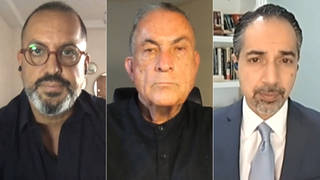
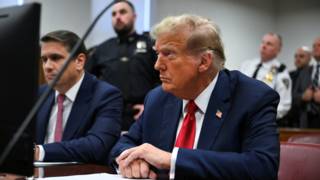
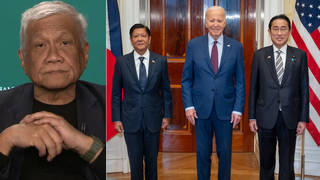
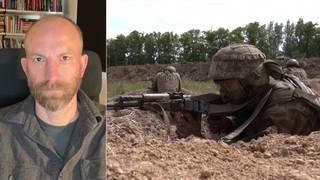





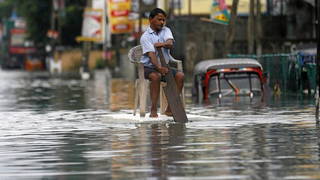
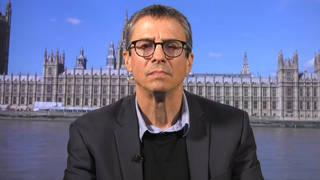
Media Options